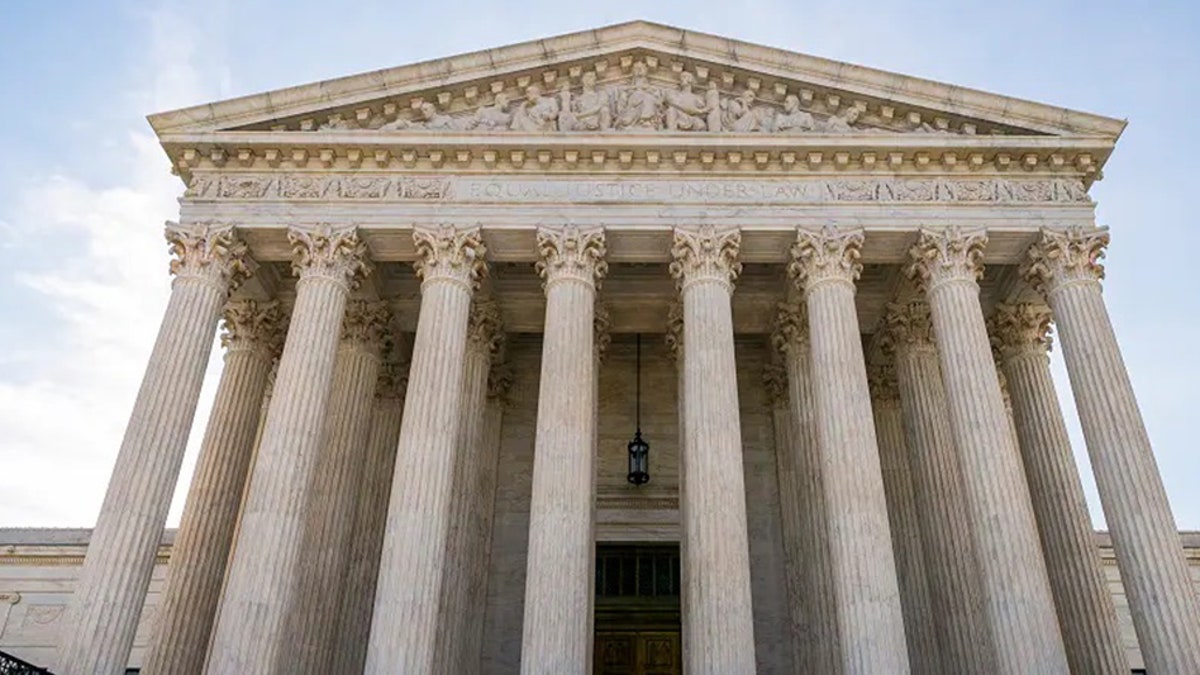Colorado is controlling my speech: Christian business owner Lorie Smith
Owner and founder of 303 Creative Lorie Smith and attorney Kristen Waggoner speaks out on the upcoming Supreme Court's free speech vs gay rights case on 'The Story.'
On Dec. 5, the U.S. Supreme Court heard oral argument in 303 Creative v Elenis, the case about Colorado graphic artist Lorie Smith. Lorie creates custom websites for clients of all backgrounds, including those who identify as LGBT. She just does not want to create custom websites celebrating same-sex marriage for anyone.
The oral argument, much like the ensuing media debate, reflected two different ways to think about this case. Is it about businesses declining to serve customers because of who they are? Or is it about artists declining to speak content because of what it says? Is it about the "who" or the "what?"
A recent New York Times op-ed by David Cole, the ACLU’s national legal director, reflects the former. But here’s how you know that op-ed is pushing narratives, not facts: It never quotes the actual facts of the case or Lorie’s actual argument.
DISGRACED SUPREME COURT WHISTLEBLOWER BUSTED FOR LYING WAS ONCE A MAINSTREAM MEDIA DARLING
In reality, Colorado conceded to these facts as did the lower court. Lorie is "willing to work with all people regardless of … sexual orientation," declines projects if they "promote content" she disagrees with, and only creates custom, unique, expressive wedding websites that "celebrate" each "couple’s wedding" and "story." No off-the-shelf templates. No plug ’n’ play. It’s all speech. It’s all about content. And it’s all undisputed.

The Supreme Court case 303 Creative v Elenis pits two views of the Constitution against one another, but it's really about not letting government compel speech.
So when Cole claims that Lorie discriminates because she declines to create "identical" websites for same-sex and opposite-sex weddings, that makes no sense. Why would anyone want someone else’s custom wedding website with pictures, text, images, and stories celebrating and directing them to a different wedding? Lorie doesn’t offer identical, off-the-shelf, plug ’n’ play websites like that. And if she did, she would happily sell such websites celebrating marriages between a man and woman to anyone.
What Cole really means is if you exchange details in the websites like the text and images and stories — the actual content — then he thinks it’s still the identical service. For Cole, it’s all just generic websites. But a website celebrating John and Jim, with their pictures and their text about how they met, fell in love, and will marry conveys a very different message when you replace it with content, pictures and text about someone else’s wedding and marriage, whether that’s for Mark and Paul or Tom and Jane.
There is no "horseshoes and hand grenades" exception in the First Amendment. The government cannot force a Muslim calligrapher to write "Believe Jesus" for a church under the theory that it is just providing the "same calligraphy services" when he writes "Believe Muhammad" for a mosque. Newsflash: Different words and different pictures can convey very different meanings. And celebrating same-sex marriage is a very different message than celebrating marriage between a man and a woman.
Nor can the ACLU or other Colorado supporters — like the Biden administration — apply their "same-service" theory consistently. In a telling moment at oral argument, Justice Amy Coney Barrett asked the Biden administration if the government could force a gay website designer to create a website for a Catholic student group promoting their religious belief about marriage.
The government cannot force a Muslim calligrapher to write "Believe Jesus" for a church under the theory that it is just providing the "same calligraphy services" when he writes "Believe Muhammad" for a mosque.
The attorney said no because "We don’t think that the expression of particular views is inextricably intertwined with having a particular religion." Translation: Declining to speak religious content you disagree with is not discrimination and OK, but Lorie must speak same-sex wedding content she disagrees with because that somehow is impermissible discrimination. Barrett’s response says it all: "So this is a carveout that’s applicable just to the same-sex context?"
Once we see this case is all content and the state picking ideological winners, the rest of Cole’s argument crumbles, too. Cole says that Lorie — unlike wealthy artists such as photographer Annie Leibovitz — chose to go into business, "benefit from the public marketplace," and therefore gave up her First Amendment freedoms.
CLICK HERE TO GET THE OPINION NEWSLETTER
But that is not how the First Amendment works. Artists don’t lose their right to control what they say when they choose to make a living. A newspaper, for example, doesn’t give up its right to control its content by running a newspaper business. Students don’t give up their right to not pledge to the flag by attending public schools. Drivers don’t give up their right to not display ideological mottos on their cars by choosing to drive on the road. The Supreme Court found the government could not compel speech in these situations because it’s no choice at all when the government demands you to choose between your rights and something essential, like earning a living.
Once again, the ACLU cannot possibly apply its theory consistently. After all, the ACLU has supported the lawsuits of billion-dollar social-media companies to control what other people say on their platforms, saying the "market power of a private speaker does not void" their First Amendment rights. So, according to the ACLU, tech companies enter the marketplace and retain their First Amendment freedoms, but singular artists and everyday Americans like Lorie don’t.
CLICK HERE TO GET THE FOX NEWS APP
All this shows is that the ACLU no longer advocates for free speech but wants the government to target some views the ACLU disagrees with. Thankfully, the Supreme Court doesn’t interpret the First Amendment that way and has indeed asked the right question about 303 Creative: Can the government compel any artist to speak any view they object to?
The debate about the case, however, highlights a different question we should all be asking: What happened to the ACLU?











































